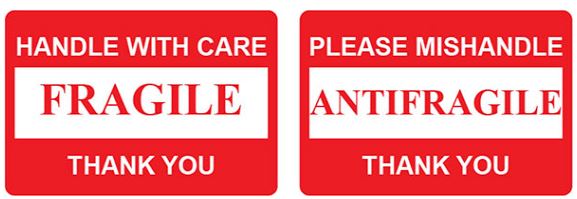Antifragile
How To Benefit From Disorder
Antifragility allows us to deal with the unknown, to do things without understanding them - and do them well

Antifragile is a term coined by Nassim Taleb to represent things that benefit from disorder.
Fragile things are harmed by disorder. For example, a bone china tea cup and saucer are fragile. If you accidentally drop them on the
floor, they will break. To protect such fragile crockery, it is handled with care.
Robust and resilient things, such as objects made of steel, are commonly regarded as the opposite of fragile. But, strictly speaking, being unaffected by disorder is not the opposite of being harmed by disorder.
There is not a word that means the "opposite of fragility" thus Taleb created the term antifragile, which is defined as things that benefit from disorder.
Antifragility is the quality of something that gets better, or thrives, in the presence of disorder.
A good example of something that is antifragile is the body’s immune system which when exposed to a low dose of a virus such as Covid 19 and its variants the body’s immune system starts to develop an ability to fight it.

In his book Antifragile: Things That Gain from Disorder
Nassim Taleb says:
"Some things benefit from shocks; they thrive and grow when exposed to volatility, randomness, disorder, and stressors and love adventure , risk, and uncertainty.
Yet, in spite of the ubiquity of the phenomenon, there is no word for the exact opposite of fragile. Let us call it antifragile. Antifragility is beyond resilience or robustness.
The resilient resists shocks and stays the same; the antifragile gets better.
This property is behind everything that has changed with time: evolution, culture, ideas, revolutions, political systems, technological innovation, cultural and economic success, corporate survival, good recipes (say, chicken soup or steak tartare with a drop of cognac), the rise of cities, cultures, legal systems, equatorial forests, bacterial resistance … even our own existence as a species on this planet.
The antifragile loves randomness and uncertainty, which also means— crucially—a love of errors, a certain class of errors.
Antifragility has a singular property of allowing us to deal with the unknown, to do things without understanding them - and do them well.
Robustness is not enough
"Consider that Mother Nature is not just “safe.” It is aggressive in destroying and replacing, in selecting and reshuffling . When it comes to random events, “robust” is certainly not good enough.
In the long run everything with the most minute vulnerability breaks, given the ruthlessness of time— yet our planet has been around for perhaps four billion years and, convincingly, robustness can’t just be it: you need perfect robustness for a crack not to end up crashing the system.
Given the unattainability of perfect robustness, we need a mechanism by which the system regenerates itself continuously by using, rather than suffering from, random events, unpredictable shocks, stressors, and volatility."
Living an Antifragile Life
So how can you apply this insight?
At time of writing in Spring 2021 as the world lurches towards eventual recovery from the coronavirus pandemic life is messy and seemingly getting messier.
Are there ways in which you can position yourself to make gains from this disorder and get stronger?
The answer is yes. There are principles you can follow that will help you.
Shane Parrish suggests these core principles:
- Stick to simple rules
- Build in redundancy [have back-up plans] and layers [no single point of failure]
- Resist the urge to suppress randomness
- Make sure that you have your soul in the game
- Experiment and tinker — take lots of small risks
- Avoid risks that, if lost, would wipe you out completely
- Don’t get consumed by data
- Keep your options open
- Focus more on avoiding things that don’t work than trying to find out what does work
- Respect the old — look for habits and rules that have been around for a long time
Further reading on the qualities of antifragility and practical tactics for Living Antifragile
If you play the long game you stop optimizing for the short term and start thinking ahead to the second-order consequences of your decisions.
It’s hard to play the long game when there is a visible negative as the first step.
You have to be willing to look like an idiot in the short term to look like a genius in the long term.
Further reading:
Return from "Antifragile" to: Mental Models
LATEST ARTICLES
Master The Season You Are In - The Key to Fulfilling Your Purpose
 To fulfil your purpose, you must first master the season you are in. One of the biggest mistakes you can make in life is focusing all your energy on the next season instead of learning to master the s…
To fulfil your purpose, you must first master the season you are in. One of the biggest mistakes you can make in life is focusing all your energy on the next season instead of learning to master the s…The Inner Weight of Shame - Sustained By Attentional Fixation
 A Mind That Is Continuously Engaged In Self-Surveillance. Shame is one of the heaviest inner burdens a human being can carry. It does not announce itself loudly or demand attention through drama. Inst…
A Mind That Is Continuously Engaged In Self-Surveillance. Shame is one of the heaviest inner burdens a human being can carry. It does not announce itself loudly or demand attention through drama. Inst…Does Prayer Work? The Psychology of Prayer, Meditation and Outcomes
 Reality Is A Complex System Of Countless Interactions - Including Yours. So does prayer work? The problem is that the question itself is usually framed in a way that guarantees confusion. We tend to a…
Reality Is A Complex System Of Countless Interactions - Including Yours. So does prayer work? The problem is that the question itself is usually framed in a way that guarantees confusion. We tend to a…Living in Survival Mode Without Surrendering Mental Authority
Living in Survival Mode Without Surrendering Mental Authority
 Clear Thinking When You’re Just Trying to Stay Afloat. Many people today are overwhelmed because they are living in survival mode - not temporarily, but as a persistent condition of life. For many, th…
Clear Thinking When You’re Just Trying to Stay Afloat. Many people today are overwhelmed because they are living in survival mode - not temporarily, but as a persistent condition of life. For many, th…Manifestation Without Magic: A Practical Model
 Manifestation without magic is not a softer or more intellectual version of popular manifestation culture. It is a different model altogether. Popular manifestation teachings tend to frame reality as…
Manifestation without magic is not a softer or more intellectual version of popular manifestation culture. It is a different model altogether. Popular manifestation teachings tend to frame reality as…Staying Committed When You Can't See Progress - The Psychology of Grit
 Uncertainty Is Not The Absence Of Progress, Only The Absence Of Reassurance. One of the most destabilising experiences in modern life is not failure, but uncertainty and staying committed when you can…
Uncertainty Is Not The Absence Of Progress, Only The Absence Of Reassurance. One of the most destabilising experiences in modern life is not failure, but uncertainty and staying committed when you can…The Battle For Your Mind - How To Win Inner Freedom In A Digital Age Of Distraction
 From External Events to Inner Events. We often think of “events” as things that happen out there: the traffic jam, the rude comment, the delayed email reply. But what truly shapes our experience is wh…
From External Events to Inner Events. We often think of “events” as things that happen out there: the traffic jam, the rude comment, the delayed email reply. But what truly shapes our experience is wh…How to See Your Thoughts Without Becoming the Story
 A Practical Guide to Thought-Awareness. You can spend your life inside the stories of your mind without ever learning how to see your thoughts clearly and objectively. Most of the stuff we tell oursel…
A Practical Guide to Thought-Awareness. You can spend your life inside the stories of your mind without ever learning how to see your thoughts clearly and objectively. Most of the stuff we tell oursel…The Collison Decision Matrix - A Simple Framework for Better Choices
 The Collison Decision Matrix Is A Practical Everyday Thinking Tool. Most of us spend a surprising amount of time worrying about decisions. From small ones such as what to wear, what to eat, what to te…
The Collison Decision Matrix Is A Practical Everyday Thinking Tool. Most of us spend a surprising amount of time worrying about decisions. From small ones such as what to wear, what to eat, what to te…The Power Of Asking The Right Question
 The Power Of Asking The Right Question Lies In The Quest For Insight. To experience the power of asking the right question you must develop the practice of asking questions. The best way to improve th…
The Power Of Asking The Right Question Lies In The Quest For Insight. To experience the power of asking the right question you must develop the practice of asking questions. The best way to improve th…Site Pathways
 Here is a site pathway to help new readers of Zen-Tools navigate the material on this site. Each pathway is based around one of the many key themes covered on this site and contain a 150 word introduc…
Here is a site pathway to help new readers of Zen-Tools navigate the material on this site. Each pathway is based around one of the many key themes covered on this site and contain a 150 word introduc…